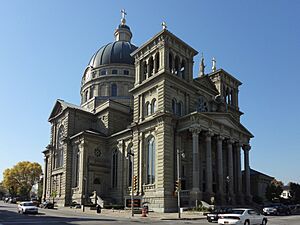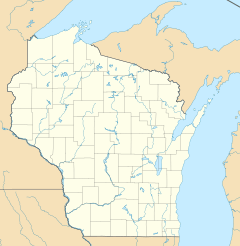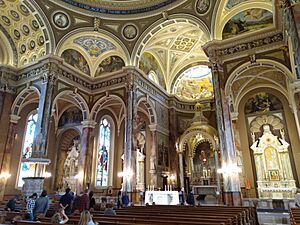Basilica of St. Josaphat facts for kids
Quick facts for kids Basilica of Saint Josaphat |
|
|---|---|

The Basilica of St. Josaphat
|
|
| Religion | |
| Affiliation | Roman Catholic |
| Province | Archdiocese of Milwaukee |
| Ecclesiastical or organizational status | Minor basilica |
| Status | Active |
| Location | |
| Location | Milwaukee, Wisconsin, US |
| Architecture | |
| Architect(s) | Erhard Brielmaier (architect) Gonippo Raggi (painter) |
| Architectural type | Church |
| Architectural style | Polish cathedral style |
| Completed | 1901 |
| Official name: Basilica of St. Josaphat | |
| Designated | March 7, 1973 |
| Reference no. | 73000089 |
| Governing body | Private |
The Basilica of St. Josaphat is a beautiful Catholic church in Milwaukee, Wisconsin, in the United States. It's called a "minor basilica" because the Pope gave it a special title. This means it's an important place for pilgrims and has historical meaning.
The church was finished in 1901. It was built in a special style called the Polish cathedral style. The people who built it were Polish immigrants who came to Milwaukee. The basilica is named after Josaphat Kuntsevych, a saint.
What's really cool is that the basilica was built using materials from an old government building in Chicago. This old building was the U.S. Custom House. In 1929, Pope Pius XI gave St. Josaphat Church its special title. The basilica is also listed on the National Register of Historic Places.
Contents
Building a Grand Church
Early Polish Community in Milwaukee
Many Polish people started moving to Milwaukee in the 1840s. By the late 1800s, they were the second-largest group of people in the city. In 1866, the first Polish church in a city in the U.S. was started. It was called Saint Stanislaus parish.
The Saint Josaphat church community started from Saint Stanislaus in 1888. Their first church building sadly burned down in 1889.
Designing the New Church
After the first church burned, a new one was built. But the community grew so much that they needed an even bigger church! In 1896, Pastor Wilhelm Grutza asked Erhard Brielmaier to design a new church. Erhard Brielmaier was a famous church architect.
The new church was designed in the Polish cathedral style. This style was popular for Polish churches. The plans for the Basilica of St. Josaphat were even based on the famous St. Peter's Basilica in Rome!
Recycling a Building for Construction
As the design was almost ready, Father Grutza heard some amazing news. An old government building in Chicago was being torn down. This building was the U.S. Custom House.
Father Grutza bought 200,000 tons of materials from the old building for $20,000. That's a lot of material! It was brought to Milwaukee on 500 railroad cars. Church members were waiting to help start building.
Construction and Dedication
Before building could start, a big hill had to be leveled. It was about 30 feet tall. People and horses worked together to move the earth. The first stone of the church was placed on July 4, 1897. Many church members, who were not professional builders, helped with the work. They worked under Erhard Brielmaier's guidance.
The church was officially opened in 1901. Archbishop Francis Xavier Katzer led the ceremony. About 4,000 people came to celebrate. Once finished, the church could seat 2,400 people. It was the biggest church in Milwaukee at the time.
Becoming a Basilica
In 1929, Pope Pius XI gave St. Josaphat Church the special title of "minor basilica." This made it only the third church in the United States to get this honor. It showed that the church was a very important place.
Repairs and Restoration
Over the years, the basilica needed some repairs. In 1940, an electrical fire caused a lot of smoke damage inside. In 1947, a lightning storm knocked loose some big stones from the dome.
From 1948 to 1951, major repairs were done. The beautiful paintings inside were also fixed. In 1986, strong winds tore a copper sheet from the dome, causing water damage. This led to a big effort to raise money. The St. Josaphat Basilica Foundation was started in 1991. This allowed for a huge restoration project to begin.
Inside the Basilica
The inside of the Basilica of St. Josaphat is truly amazing. The first large painting, called The Martyrdom of St. Josaphat, was painted in 1904 by Tadeusz Żukotyński. It is located right behind the main altar.
Most of the other beautiful paintings on the walls and dome were done by Gonippo Raggi. These paintings show scenes from the Bible. The church also has stunning stained glass windows that came from Austria in 1902. The company Conrad Schmitt Studios later restored the inside of the basilica to look just as it did in 1926.
See also
 In Spanish: Basílica de San Josafat (Milwaukee) para niños
In Spanish: Basílica de San Josafat (Milwaukee) para niños
- List of churches in the Roman Catholic Archdiocese of Milwaukee
- Lincoln Village, Milwaukee
- Polish Cathedral style
- Wacław Kruszka
- Tadeusz Żukotyński
- List of tallest buildings in Milwaukee
 | Frances Mary Albrier |
 | Whitney Young |
 | Muhammad Ali |



